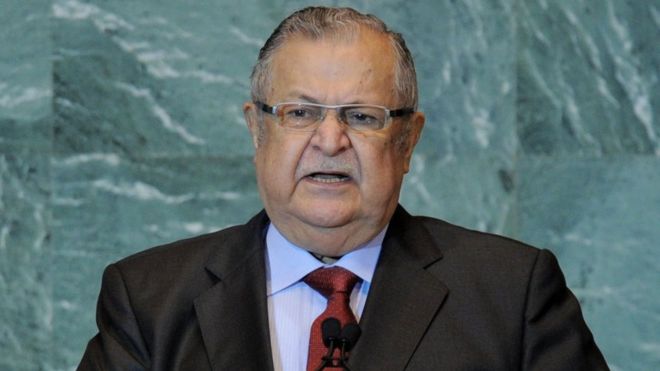
Jalal Talabani (1933-2017)
Kurdish leader and former President of Iraq (2005-2014), Jalal Talabani, breathed his last on 3 October 2017 in Germany. He was 83 and was under treatment in Berlin since 2012 after suffering a stroke. Talabani had served as the President of the Governing Council of Iraq briefly in 2003 after the fall of Saddam Hussein and played a key role in drafting of the new Iraqi constitution. In April 2006 was elected President under the new Iraqi constitution. One of the tallest Kurdish leaders in contemporary Iraq, Talabani, was instrumental in steering the political transition in Iraq in the wake of the US-led invasion of Iraq and the subsequent fall of the Saddam Hussein regime.
Coming from a prominent family of Iraqi Kurdistan, Talabani was drawn towards the Kurdish movement for autonomy in 1961 and joined the Kurdish uprising led by Mustafa Barzani, leader of the Kurdistan Democratic Party (KDP). He led the guerrilla war against Baghdad in Kirkuk and Silemani but fell out of Barzani and quit the KDP to join a splinter group and co-founded the Patriotic Union of Kurdistan (PUK) in 1975 that launched an armed struggle for Kurdish independence in the 1980s. During the Iran-Iraq War (1980-88), the PUK received support from Iran. In 1987 the Ba’athist government in Baghdad launched a brutal campaign to crush the Kurdish national movement and Baghdad used chemical weapons to annihilate the Kurds. Talabani survived and sneaked out through Iran and visited the United States.
After the 1991 Kuwait crisis Talabani initiated negotiations with Baghdad, leading to a ceasefire which saved lives of thousands of Kurds and finally leading to the formation of the Kurdish Regional Government (KRG) in 1992. Talabani in his bid to reconcile with Baghdad had an embarrassing moment in his political carrier when he was photographed kissing Hussein during the course of negotiations. This gesture towards a figure hated by the Kurds harmed his political ambitions but in the elections for the KRG legislative council Talabani’s PUK and the KDP received almost an equal number of seats.
The tensions between KDP which was now led by Massoud Barzani, son of Mustafa Barzani, flared up in 1994 and in fighting broke out between the two Kurdish factions over power sharing. Talabani led the PUK faction and eventually signed a US-mediated peace agreement with Barzani, the current president of the KRG.
While Talabani remained committed to the ideals of independent Kurdistan, after the fall of Saddam, he preferred to play the role of an elder statesman and worked towards bringing the divided house of Iraq together and to form a functional democratic system with an autonomous KRG.
Popularly known as Mam Talabani (Uncle Talabani) among Kurds, Talabani was recognized as a pragmatic but wily politician who understood the moods of the Kurds and aligned with world powers to extend the interests of KRG. Iraqi and world leaders have expressed their grief on the passing away of the tall Kurdish leader. Prime Minister Haider al-Abadi extended his condolence to the Talabani family and the people of Iraq. The office of KRG President Massoud Barzani issued a statement saying “We are saddened for Mam [uncle] Jalal Talabani’s pass[ing] away” and that “Kurdistan in this juncture needed more than before his wisdom.”
The passing away of Talabani comes at the most critical time for the Kurds. In recent weeks Baghdad, Tehran and Ankara have joined hands to punish the KRG for the non-binding independence referendum held on 25 September in which the Kurds voted overwhelmingly for an independent Kurdistan. Though Talabani’s PUK was not in power in KRG, his elderly counsel and a pragmatic approach had a calming effect on the Kurdish aspiration for independence and hence his demise leaves behind a huge legacy and void for the Kurdish nationalist aspirations.
Dr. Md. Muddassir Quamar is an Associate Fellow at the Institute of Defence Studies and Analyses (IDSA). Email
As part of its editorial policy, the MEI@ND standardizes spelling and date formats to make the text uniformly accessible and stylistically consistent. The views expressed here are those of the author and do not necessarily reflect the views/positions of the MEI@ND. Editor, MEI@ND: P R Kumaraswamy

